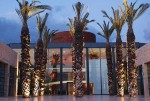The visitors centre at Barkan Winery. (photo from barkanwinery.co.il)
Wine has been made in Israel since biblical times. The Book of Deuteronomy lists seven blessed species of fruit, including “the fruit of the vine.” Israel’s Mediterranean climate boasts many microclimates, which foster a diversity of wine styles.
The modern Israeli wine industry was greatly influenced by Baron Edmond James de Rothschild, owner France’s Château Lafite Rothschild. He started making wine in Israel in the late 19th century, importing French vine varieties and winemaking knowledge, and founding Carmel Winery, today the largest wine estate in Israel.
By the late 1980s, most Israeli wine was low quality, used for sacramental purposes. But the 1990s saw a huge boom in the establishment of quality-focused boutique wineries that were taking an artisanal approach. Today there are hundreds of wineries producing in aggregate more than 10 million bottles per year. Three producers are responsible for 80 percent of the production: Carmel, Barkan and Golan Heights Winery.
This short series features nine Israeli producers about the wines they make, their individual path into winemaking and their terroir. The first in the series profiles Irit Boxer-Shank of Barkan Winery, the second-largest winery in Israel.
Christopher Barnes: How did you get involvd in wine?
Irit Boxer-Shank: Well, it’s from the family. My father used to own the winery, Barkan. Now, he’s just the CEO.
CB: How did that change?
IBS: I started out as the owner’s daughter. I grew up there since I was 10, so I did everything in the winery, from putting on the labels all the way to the vineyards, walking with the workers, and then the winery was sold to a bigger company. My father is the CEO. I’m the winemaker. We’re still there doing our stuff, and we love it, but it’s not family-owned now.
CB: Tell us a little bit about the terroir where your wines are made.
IBS: Well, because we’re a big winery, we do wines from all over the country, from the northe[rnmost] part to the south, including in the desert. We have all kinds of terroir. We have all the varieties. We do a lot of experiments. That’s what’s fun about being a winemaker in Barkan. I love it because I have fruit from all over the country. I have all kinds of varieties, and I can play all the time.
CB: How many different varieties are you making right now?
IBS: A lot of them, and we do a lot of experiments. We bring a lot of new varieties. There is now a malbec that is brand new. We’re going to bring it to the [United] States. Pinotage was the first different variety that we started growing in Israel, then we have marselan and caladoc from south of France. Well, we’re playing a lot with it. Some of them that are not as good, we’ll go back, and we’ll do something else, but we have a lot. Of course, the cabernet sauvignon is the king, it will always be the king, but we do a lot of varieties.
CB: I interviewed a winemaker in Australia who is using 60 different varieties in his wines. I said to him, “How do you keep track of it? How do you know what’s working and what’s not when you have that many?” Is it more of a challenge to make wine with a lot of different types of grapes?
IBS: I don’t think so. It’s like asking a person who has a lot of children, “How do you keep up with them?” It’s like you grow them from the beginning to the end, so you know each of the wines just like you know a person, all the way, very intimately.
CB: You mentioned malbec. How do you decide if you’re going to try a new variety?
IBS: It’s a long process. We go and try it in different countries. We see the soil and the climate that they’re growing it in, and the best versions of them – like malbec in Argentina, in the south of France. And then we go back home and see if there are very similar [conditions], as similar as we can in Israel, and then we plant just a small plot. If it’s good, we’ll plant more, and then there are trials in the winery to see how to ferment it and what kind of barrels to put it in. It takes us at least eight years to start an experiment on a variety and maybe take it to the market.
CB: Do you buy a lot of fruit?
IBS: No. One of the more interesting things about Barkan Wineries is that we grow everything ourselves. We are also the biggest grower in Israel because all of the grapes are ours, which gives us full, complete control in the winemaking.
CB: Do you have a philosophy of winemaking? Is there something that you feel is your stamp in terms of the process and the styles of wines that you make?
IBS: Well, I discovered that we like using technology to do more of the Old World style. We’re trying to have all the fun from all the different worlds, the New and the Old! That’s something that really characterizes Israelis. We do fusions – that’s what you call the Israeli kitchen cuisine: “the fusion.” We take something from the new and something from the old, and do something from Israel. I guess, in winemaking, it’s also like that.
– This article is reprinted courtesy of the Grape Collective, an online publication for all things wine. For more information, visit grapecollective.com.

